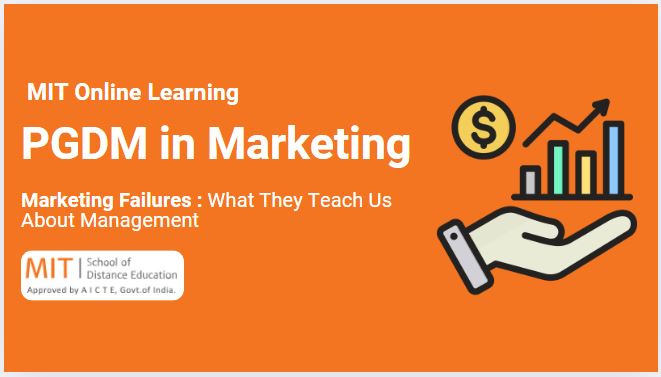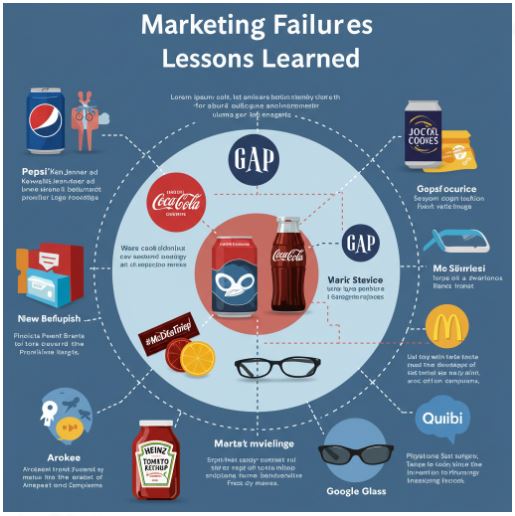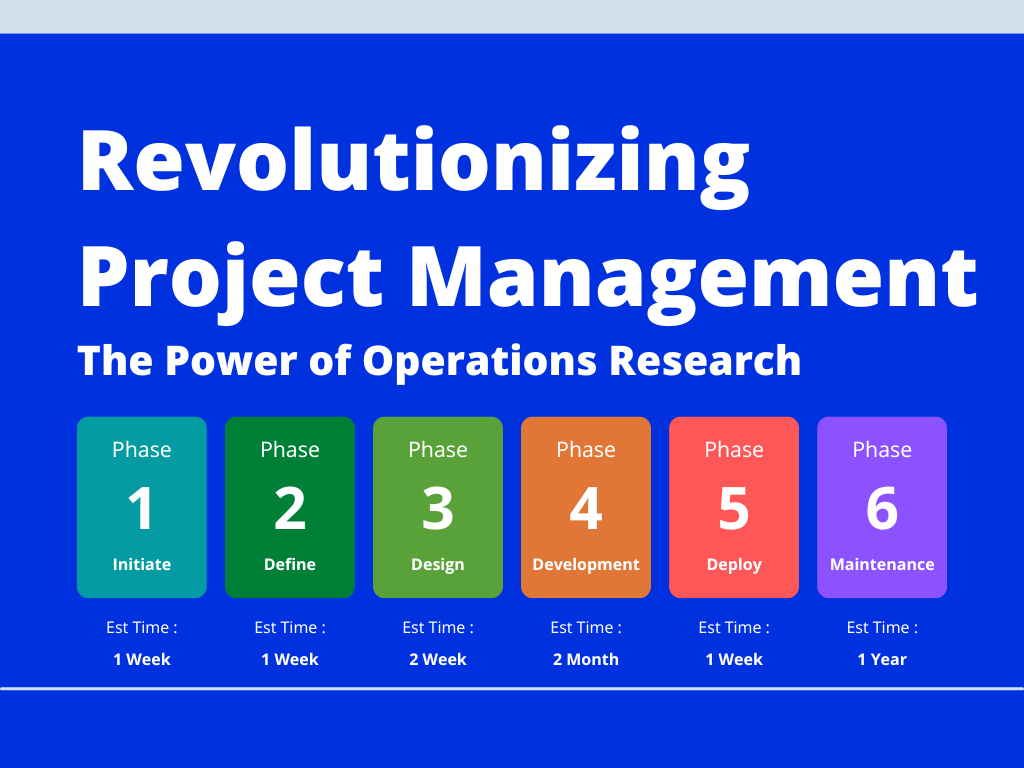
1. Pepsi’s Kendall Jenner Ad (2017) — Misjudging Social Sentiment
Pepsi’s campaign featuring Kendall Jenner attempted to position the brand as a symbol of unity during times of political protest. However, the public saw it as tone-deaf and dismissive of real social justice issues. The backlash was swift and intense, forcing Pepsi to pull the ad within 24 hours.Marketing Management Lesson:
Understanding your audience is fundamental. A lack of sensitivity to social contexts can alienate your customer base and damage brand equity.What You’ll Learn at MIT SDE:
At MIT SDE, the PGDM marketing course includes subjects like Consumer Behavior and Brand Management, which help students understand the psychological and emotional factors driving customer response. Marketing managers trained under such a curriculum are better equipped to sense societal trends and avoid such blunders.2. New Coke Launch (1985) — Breaking What Wasn’t Broken
Coca-Cola decided to reformulate its iconic beverage, branding it as “New Coke.” The backlash was massive — loyal customers felt betrayed, leading the company to return to the original formula within three months.Marketing Management Lesson:
Never underestimate brand loyalty. Even if product innovation is critical, it must be tested thoroughly before replacing a beloved offering. Change management is a vital part of marketing leadership.MIT SDE Takeaway:
In the PGDM in Marketing program at MIT SDE, students explore modules on Strategic Brand Management and Market Research. These tools enable future marketing managers to make data-driven decisions, anticipate customer reactions, and test new concepts effectively before full-scale rollout.3. Gap’s Logo Redesign (2010) — The Risk of Rebranding Without Research
Gap introduced a new logo, aiming for a modern look. But within just one week of unveiling, the company faced severe backlash from loyal customers and reverted to the original design.Marketing Management Lesson:
Brand image is deeply rooted in consumer perception. Any rebranding must be strategic, research-backed, and gradual. Marketing managers must evaluate both the functional and emotional implications of brand changes.Why MIT SDE’s Program Stands Out:
The online PGDM in Marketing from MIT SDE teaches real-world brand strategies and emphasizes the importance of aligning rebranding with customer identity and values. Students also learn the importance of design thinking and market testing before launching brand alterations.4. McDonald’s #McDStories (2012) — A Hashtag Gone Wrong
McDonald’s started a Twitter campaign asking customers to share their favorite McDonald’s stories. Unfortunately, the hashtag was hijacked, and users began posting horror stories instead. The campaign quickly spiraled out of control.Marketing Management Lesson:
Social media is powerful — and dangerous if not monitored and planned properly. Campaigns must be designed to mitigate risk and include crisis management strategies.Learning This at MIT SDE:
The PGDM marketing course at MIT SDE incorporates modules on Digital and Social Media Marketing. You’ll learn how to launch campaigns, track sentiment, and manage brand reputation online — all essential in today’s marketing environment.5. Blackberry — Failure to Adapt to Market Changes
Once a market leader, Blackberry failed to innovate quickly when touchscreen smartphones revolutionized the industry. Despite having a loyal base of business users, the company lost relevance by clinging to outdated strategies.Marketing Management Lesson:
Being a leader today does not guarantee future success. Continuous innovation and agility are the lifelines of sustained marketing relevance. Strategic foresight and adaptability are must-have skills for marketing managers.How MIT SDE Prepares You:
Through courses on Marketing Strategy, Innovation, and Business Environment Analysis, the PGDM in Marketing at MIT SDE prepares you to think long-term, predict changes, and drive innovation in highly competitive markets.1. Pepsi’s Kendall Jenner Ad (2017) — Misjudging Social Sentiment
Pepsi’s campaign featuring Kendall Jenner attempted to position the brand as a symbol of unity during times of political protest. However, the public saw it as tone-deaf and dismissive of real social justice issues. The backlash was swift and intense, forcing Pepsi to pull the ad within 24 hours.Marketing Management Lesson:
Understanding your audience is fundamental. A lack of sensitivity to social contexts can alienate your customer base and damage brand equity.What You’ll Learn at MIT SDE:
At MIT SDE, the PGDM marketing course includes subjects like Consumer Behavior and Brand Management, which help students understand the psychological and emotional factors driving customer response. Marketing managers trained under such a curriculum are better equipped to sense societal trends and avoid such blunders.2. New Coke Launch (1985) — Breaking What Wasn’t Broken
Coca-Cola decided to reformulate its iconic beverage, branding it as “New Coke.” The backlash was massive — loyal customers felt betrayed, leading the company to return to the original formula within three months.Marketing Management Lesson:
Never underestimate brand loyalty. Even if product innovation is critical, it must be tested thoroughly before replacing a beloved offering. Change management is a vital part of marketing leadership.MIT SDE Takeaway:
In the PGDM in Marketing program at MIT SDE, students explore modules on Strategic Brand Management and Market Research. These tools enable future marketing managers to make data-driven decisions, anticipate customer reactions, and test new concepts effectively before full-scale rollout.3. Gap’s Logo Redesign (2010) — The Risk of Rebranding Without Research
Gap introduced a new logo, aiming for a modern look. But within just one week of unveiling, the company faced severe backlash from loyal customers and reverted to the original design.Marketing Management Lesson:
Brand image is deeply rooted in consumer perception. Any rebranding must be strategic, research-backed, and gradual. Marketing managers must evaluate both the functional and emotional implications of brand changes.Why MIT SDE’s Program Stands Out:
The online PGDM in Marketing from MIT SDE teaches real-world brand strategies and emphasizes the importance of aligning rebranding with customer identity and values. Students also learn the importance of design thinking and market testing before launching brand alterations.4. McDonald’s #McDStories (2012) — A Hashtag Gone Wrong
McDonald’s started a Twitter campaign asking customers to share their favorite McDonald’s stories. Unfortunately, the hashtag was hijacked, and users began posting horror stories instead. The campaign quickly spiraled out of control.Marketing Management Lesson:
Social media is powerful — and dangerous if not monitored and planned properly. Campaigns must be designed to mitigate risk and include crisis management strategies.Learning This at MIT SDE:
The PGDM marketing course at MIT SDE incorporates modules on Digital and Social Media Marketing. You’ll learn how to launch campaigns, track sentiment, and manage brand reputation online — all essential in today’s marketing environment.5. Blackberry — Failure to Adapt to Market Changes
Once a market leader, Blackberry failed to innovate quickly when touchscreen smartphones revolutionized the industry. Despite having a loyal base of business users, the company lost relevance by clinging to outdated strategies.Marketing Management Lesson:
Being a leader today does not guarantee future success. Continuous innovation and agility are the lifelines of sustained marketing relevance. Strategic foresight and adaptability are must-have skills for marketing managers.How MIT SDE Prepares You:
Through courses on Marketing Strategy, Innovation, and Business Environment Analysis, the PGDM in Marketing at MIT SDE prepares you to think long-term, predict changes, and drive innovation in highly competitive markets.Admissions Open

6. Heinz EZ Squirt (2000s) — Product Innovation Without Demand
Heinz introduced brightly colored ketchups targeted at children, like purple and green variants. Initially, sales spiked due to curiosity, but the product soon lost traction because it didn’t appeal to long-term consumer habits.
Marketing Management Lesson:
Just because something is unique doesn’t mean it’s sustainable. True innovation solves a problem or enhances an experience. Marketing managers must align creativity with consumer demand and market readiness.
How MIT SDE’s Course Helps:
MIT SDE emphasizes market research and product lifecycle strategies in its PGDM marketing course, training you to evaluate the longevity and market fit of innovative ideas.
7. Google Glass — Brilliant Tech, Poor Marketing
Google Glass was a revolutionary product technologically, but its marketing failed to communicate clear use cases. It faced privacy concerns and was seen as a gimmick rather than a necessity.
Marketing Management Lesson:
A successful product needs not just great engineering but also strategic marketing. Clear value propositions, consumer education, and addressing public concerns are key.
How MIT SDE Prepares You for This:
MIT SDE’s best PG diploma in marketing programs include courses on Product Management and Customer Value, which teach you how to launch tech products that people understand, trust, and want to buy.
8. Quibi — Big Budget, Wrong Timing
Quibi was a short-form video platform with celebrity-backed content and billions in funding. Yet it shut down just six months after launch due to a flawed value proposition and unclear market need.
Marketing Management Lesson:
No matter the investment, if your marketing strategy fails to address timing, target audience, and convenience, the product can fail. Strategic planning is vital.
Online Learning with MIT SDE:
In MIT SDE’s online PGDM in marketing, you’ll study entrepreneurship, digital product positioning, and consumer analytics — essential knowledge for launching and sustaining a new brand in a dynamic market.
Why Understanding Marketing Failures Matters for Future Marketing Managers
Marketing failures are not just cautionary tales; they are classrooms in disguise. These cases expose the weak links in planning, strategy, execution, and leadership. As a marketing professional or student, analyzing these missteps sharpens your critical thinking, prepares you for real-world challenges, and cultivates a mindset for proactive marketing management.
Learn from the Best — MIT SDE’s PGDM in Marketing
At MIT School of Distance Education, our PGDM marketing course is curated by experts who bring both academic knowledge and real-world experience. With a flexible, online-first approach, MIT SDE provides:
- Practical learning through case studies and real-life campaigns
- Specialization in digital, branding, and strategic marketing
- An industry-aligned curriculum tailored to evolving trends
- Flexible learning for working professionals and fresh graduates
Whether you’re looking for the best PG diploma in marketing or a career boost through an online PGDM in marketing, MIT SDE offers the tools and guidance to become a confident, future-ready marketing manager.
Conclusion
Marketing is not immune to mistakes — even the best brands can falter. But great marketing managers are those who learn, adapt, and apply these lessons effectively. As you advance in your career or studies, remember that every failure you study is a stepping stone to marketing mastery.



